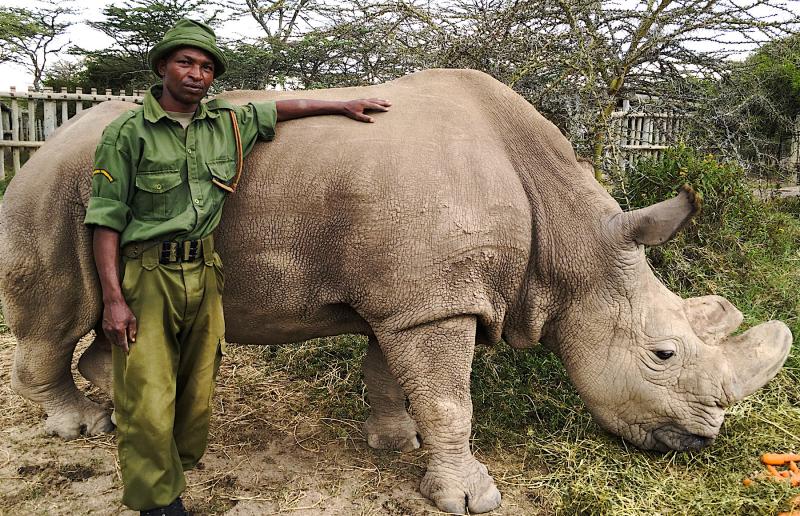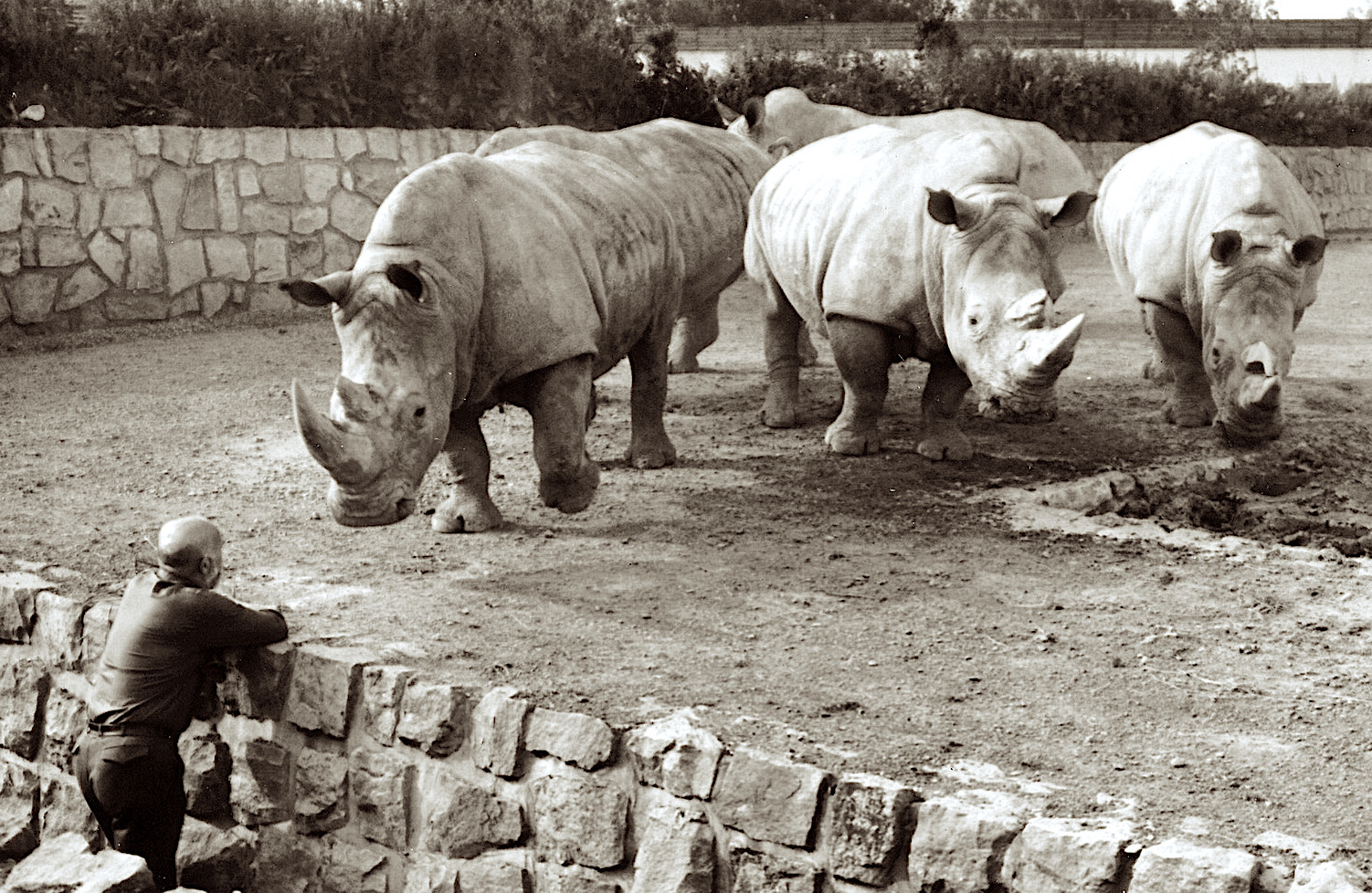Sudan: The Last of the Rhinos, BBC Two review - requiem for disappearing wildlife | reviews, news & interviews
Sudan: The Last of the Rhinos, BBC Two review - requiem for disappearing wildlife
Sudan: The Last of the Rhinos, BBC Two review - requiem for disappearing wildlife
Scientists fight a rearguard action against animal extinction

“The northern white rhinos are just a symbol of what we do to the natural world,” as one of the contributors to this haunting documentary put it.
This story of the 43-year-old rhino Sudan, named after the homeland from which he was whisked away as a baby to be installed in Dvůr Králové zoo in Czechoslovakia (as it then was), was a terrific documentary for a number of reasons. Obviously it was a film about wildlife and the terrible depredations animals have suffered from hunters, poachers, wars and social upheaval, but director Rowan Deacon also wanted to tell the stories of a lot of committed people trying to do their best against ever-mounting odds. Sudan – now housed under permanent guard in the Ol Pejeta conservancy in Kenya, with females Najin and Fatu – is the last living male northern white rhino on earth, and he’s getting old and tired. All the combined efforts of vets, naturalists, conservationists and zoologists to protect these animals in the wild having failed, it’s now down to a squad of scientists to save the species by working out how to carry out IVF treatment on rhinos, while there are still a couple of northern white females living (Sudan and friends in Czechoslovakia, pictured below).
 “In this case, no failure is allowed,” declared Professor Thomas Hildebrandt, from the Leibniz research institute in Berlin, but as yet the efforts of his team have been demoralisingly fruitless. The operation is complicated and fraught with unknowns (for instance, the female eggs have to be collected by inserting a long probe 1.5m into the rhino’s rectum). So far, they’ve only made trial runs using the somewhat less endangered southern white rhino, but no bouncing baby rhinos have yet emerged. The closing credits left us dangling from an evolutionary cliff edge by our fingernails.
“In this case, no failure is allowed,” declared Professor Thomas Hildebrandt, from the Leibniz research institute in Berlin, but as yet the efforts of his team have been demoralisingly fruitless. The operation is complicated and fraught with unknowns (for instance, the female eggs have to be collected by inserting a long probe 1.5m into the rhino’s rectum). So far, they’ve only made trial runs using the somewhat less endangered southern white rhino, but no bouncing baby rhinos have yet emerged. The closing credits left us dangling from an evolutionary cliff edge by our fingernails.
Another theme was changing attitudes to wildlife and conservation, though maybe not quite in the way you’d expect. Sudan, along with five other rhinos, was rounded up by employees of Richard Chipperfield’s safari park operation to fulfil an order from the Czechoslovak zoo. One of the catchers, Peter Litchfield, admitted he’d felt qualms about plucking the animals out of their natural environment, but while there’s now a general view that even good zoos are bad, they did at least save these rhinos from certain death at the hands of poachers, who killed all the ones which remained. Joe Vagner, who ran Dvůr Králové, seems to have had a sincere interest in animal welfare, which was shared by his staff. For far too many species, zoos and their breeding programmes represent their last hope.
Forty years ago, the penny hadn’t quite dropped that all the world’s wildlife was on course for systematic annihilation, though Dr Kes Hillman-Smith, a British zoologist who spent over 20 years in the wild studying rhinos, was seen predicting disaster on the BBC’s Nationwide. Another Chipperfield employee recalled the huge herds of elephants and other animals they’d see on their collecting trips. Now, the “natural habitats” of yore have frequently become bandit country prowled by heavily-armed gangs of paramilitary poachers, as mafia-style syndicates hunt rhino horn and ivory for the affluent Asian markets. The answer would be draconian legal penalties and a well-funded standing army with plenty of air support, but who’s going to pay for it?
There was a sad, lingering sequence of Sudan, slumped in the corner of his enclosure and looking as if he’d decided enough might finally be enough. Zach, his devoted keeper, patted the old boy despondently. “I’ll feel lonely,” he confessed.
The future of Arts Journalism
You can stop theartsdesk.com closing!
We urgently need financing to survive. Our fundraising drive has thus far raised £49,000 but we need to reach £100,000 or we will be forced to close. Please contribute here: https://gofund.me/c3f6033d
And if you can forward this information to anyone who might assist, we’d be grateful.

Subscribe to theartsdesk.com
Thank you for continuing to read our work on theartsdesk.com. For unlimited access to every article in its entirety, including our archive of more than 15,000 pieces, we're asking for £5 per month or £40 per year. We feel it's a very good deal, and hope you do too.
To take a subscription now simply click here.
And if you're looking for that extra gift for a friend or family member, why not treat them to a theartsdesk.com gift subscription?
more TV
 Coldwater, ITV1 review - horror and black comedy in the Highlands
Superb cast lights up David Ireland's cunning thriller
Coldwater, ITV1 review - horror and black comedy in the Highlands
Superb cast lights up David Ireland's cunning thriller
 Blu-ray: The Sweeney - Series One
Influential and entertaining 1970s police drama, handsomely restored
Blu-ray: The Sweeney - Series One
Influential and entertaining 1970s police drama, handsomely restored
 I Fought the Law, ITVX review - how an 800-year-old law was challenged and changed
Sheridan Smith's raw performance dominates ITV's new docudrama about injustice
I Fought the Law, ITVX review - how an 800-year-old law was challenged and changed
Sheridan Smith's raw performance dominates ITV's new docudrama about injustice
 The Paper, Sky Max review - a spinoff of the US Office worth waiting 20 years for
Perfectly judged recycling of the original's key elements, with a star turn at its heart
The Paper, Sky Max review - a spinoff of the US Office worth waiting 20 years for
Perfectly judged recycling of the original's key elements, with a star turn at its heart
 The Guest, BBC One review - be careful what you wish for
A terrific Eve Myles stars in addictive Welsh mystery
The Guest, BBC One review - be careful what you wish for
A terrific Eve Myles stars in addictive Welsh mystery
 theartsdesk Q&A: Suranne Jones on 'Hostage', power pants and politics
The star and producer talks about taking on the role of Prime Minister, wearing high heels and living in the public eye
theartsdesk Q&A: Suranne Jones on 'Hostage', power pants and politics
The star and producer talks about taking on the role of Prime Minister, wearing high heels and living in the public eye
 King & Conqueror, BBC One review - not many kicks in 1066
Turgid medieval drama leaves viewers in the dark
King & Conqueror, BBC One review - not many kicks in 1066
Turgid medieval drama leaves viewers in the dark
 Hostage, Netflix review - entente not-too-cordiale
Suranne Jones and Julie Delpy cross swords in confused political drama
Hostage, Netflix review - entente not-too-cordiale
Suranne Jones and Julie Delpy cross swords in confused political drama
 In Flight, Channel 4 review - drugs, thugs and Bulgarian gangsters
Katherine Kelly's flight attendant is battling a sea of troubles
In Flight, Channel 4 review - drugs, thugs and Bulgarian gangsters
Katherine Kelly's flight attendant is battling a sea of troubles
 Alien: Earth, Disney+ review - was this interstellar journey really necessary?
Noah Hawley's lavish sci-fi series brings Ridley Scott's monster back home
Alien: Earth, Disney+ review - was this interstellar journey really necessary?
Noah Hawley's lavish sci-fi series brings Ridley Scott's monster back home
 The Count of Monte Cristo, U&Drama review - silly telly for the silly season
Umpteenth incarnation of the Alexandre Dumas novel is no better than it should be
The Count of Monte Cristo, U&Drama review - silly telly for the silly season
Umpteenth incarnation of the Alexandre Dumas novel is no better than it should be
 The Narrow Road to the Deep North, BBC One review - love, death and hell on the Burma railway
Richard Flanagan's prize-winning novel becomes a gruelling TV series
The Narrow Road to the Deep North, BBC One review - love, death and hell on the Burma railway
Richard Flanagan's prize-winning novel becomes a gruelling TV series

Add comment